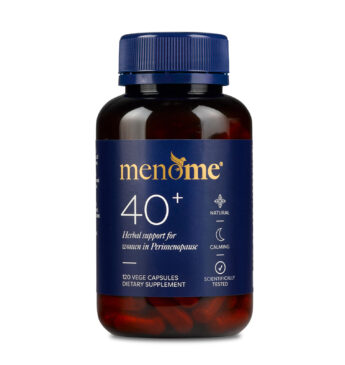Perimenopause Supplements
Natural Hormone Support for Women in Perimenopause
Do perimenopause supplements really work?
The efficacy of perimenopause supplements really depends on the ingredients used and the supporting body of scientific evidence that the chosen ingredients provide measurable results. While there may be products out there that do not have much scientific backing, the hero ingredient in MenoMe’s 40+ and 55+ is EstroG-100™ which has been the subject of research studies that support its benefits.
EstroG-100™ has been the subject of three published research studies specifically on menopause. As a result of these studies, EstroG-100™ has been approved for use as safe by Health Canada, US FDA and Korea FDA.
As each individual is different, results women get from taking herbal remedies, (or any pharmaceutical treatment), can vary from person to person. However, there is evidence that quality perimenopause supplements such as MenoMe 40+ are safe and effective.
What things can help perimenopause naturally?
Perimenopause is a normal, natural biological process that occurs, but it can unfortunately bring along with it challenging symptoms for some women. This might include things such as anxiety, sleeplessness, hot flushes, and low libido. For best results, managing the signs of perimenopause naturally takes a holistic approach incorporating many areas of wellness. This might include good nutrition, reducing processed foods, caffeine and alcohol, and incorporating regular exercise and mindfulness practice into each day to reduce stress. Science also shows us that having a community of friends and loved ones can have a positive impact on how the journey of perimenopause is experienced.
Alongside lifestyle factors, choosing evidence-backed and proven natural supplementation can help to optimise hormonal balance. Thus supporting mood, temperature regulation, bone density and overall wellbeing.
What natural herbs are good for perimenopause?
Several herbs are traditionally used to support women in perimenopause but many come with question marks or potential risks. EstroG-100™ – which is a blend of three herbal root extracts – has been shown by science to be safe and effective. The patented blend of a sage-like herb (Phlomus Umbrosa), a form of milkweed (Cynanchum Wilfordii) and Angelica (Angelica Gigas Nakai) is backed by trustworthy scientific research and have a very high safety profile.
Out of 70 herbs trialled for use to address menopause symptoms, the combination of these three delivered the most effective results.
This is why we have chosen to use EstroG-100™ to be the hero ingredient in MenoMe® supplements.







